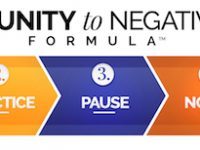Tina Hallis's Blog, page 21
August 4, 2019
What Causes Us the Most Negativity? And How Can We Build Our Immunity?

What causes us the most negativity? Based on anonymous surveys and feedback from clients, the answers I get almost always point to one major contributor – Other People! I hear about frustrating coworkers, unhappy customers, pessimistic family members, and difficult bosses. Even people that we enjoy being with can be negative at times. For example when they vent to us about their frustrating coworkers, customers, etc.
A common question I get is, “How can I change this other person? How can I make them more positive? Working (living, interacting) with them is bringing me down.”
I get it! My mood, energy, and attitude are easily impacted by other people. But I didn’t have a good answer. However, this question inspired me to find an answer. I reached out to 15 experts, interviewing them about their experience and knowledge in this area. What I learned has changed my life and I’m hoping it will change the lives of many others, including you.
As I analyzed and summarized all that I had learned from life coaches, psychologists, counselors, and best selling authors from around the country, I noticed themes that emerged that fell into a pattern that I now call the 5-step Immunity to Negativity Formula.
As you know, changing other people is hard, especially if they don’t want to change. Instead, a much more effective and faster way to improve the situation is to change ourselves. Yikes! This didn’t sound like the answer I was hoping for! But as I experimented with some of the ideas I had learned, I realized it was true. If I want to change how I feel when I’m around other people’s negativity, I have to start with me; I have to build my immunity.
The Immunity to Negativity Formula

I will be sharing tools from each step of the Immunity to Negativity Formula in future positivity tips. Step 1. is Prepare. This step is divided into two parts; charging our positivity battery and shifting our perspective.
in future positivity tips. Step 1. is Prepare. This step is divided into two parts; charging our positivity battery and shifting our perspective.
Let’s start with part 1. It’s much easier to remain calm when our positivity battery is charged. Imagine interacting with someone who’s being negative when you’re stressed, upset, or feeling drained. Now think of how much easier it would be if you were upbeat, optimistic, and feeling good. This provides us more resources, resilience, and willpower in those difficult interactions.
How can you make sure your positivity battery is charged so you can be more immune to other people’s negativity? Here are a few ideas from the experts I interviewed.
Count your blessings.
Take several deep breaths to calm down.
Be nice to yourself physically and emotionally. Remember, it’s self-care, not selfishness.
Go for a walk. Get fresh air and get your blood moving.
July 28, 2019
Probably the Most Important Contributor to our Wellbeing that Freaked Me Out

When I first started studying Positive Psychology, there was one significant happiness factor that freaked me out. It was repeated over and over and kept coming up as a main contributor to our physical and emotional wellbeing. A large amount of research supports that the strength of our social network is critical to our positivity and health. This freaked me out because I’m an introvert and prefer people in small doses.
As I continued to read and learn, I eventually discovered that it’s not the quantity but the quality of our connections that matters. Studies show that as humans, we do better when we have someone in our lives that we care about and when we know that someone cares about us. Phew! That news made me feel better.
“The need for connection begins even before birth. It goes literally from the womb to the tomb. Relationship affects our physical and mental functioning throughout life.” – Dr. Henry Cloud, author of The Power of the Other
And it made me realize that I need to nurture my relationships. I find it can be easier to just stay home or to feel that I’m too busy to take time to spend with friends and family. But now I realize that this time is an important investment that is not only fun but improves my overall wellbeing (and hopefully theirs, too!). It could even be a quick phone call or text.
Of course, it’s helpful if these people bring out your best, make you feel good, and add to the overall happiness of your day. It’s not so good if they bring you down, cause you stress, or make you feel discouraged. I’m not saying you should totally avoid people who are more negative, but you may want to limit your time or find ways to charge your positivity battery before or after these interactions.
How about you? Do you have healthy social relationships that you invest in? What could you do this week to nurture one or more of these connections?
July 21, 2019
Why Reading These Tips Won’t Make Your Life Better – Knowing & Doing Are Not the Same

Wouldn’t it be fantastic if you could spend more time feeling happy, optimistic, content, and grateful? Wouldn’t it be nice if you could spend less time feeling stressed, frustrated, discouraged, and grumpy? I didn’t know it was even possible, much less how to do it, until I discovered Positive Psychology back in 2011.
In the past eight years, I’ve learned a ton! I’ve read many books, articles, and papers. I’ve taken classes and watched videos from experts in this field. I’ve discussed and taught these concepts hundreds if not thousands of times. With all of this knowledge and information, you would think that I would be positive and upbeat most of the time! Yet, there are still days I struggle.
This brings me to another key thing I’ve realized during my journey; knowing and doing are not the same thing. I know, I know. . . You’ve heard this before. It’s not new, but the truth of this phrase really hits home for me on those days I’m not “doing” or practicing what I’ve learned.
“Knowledge provides potential, but without action, the potential is never realized.”
That’s why my goal with these weekly tips isn’t to just share information, but to also suggest ways you might take action on it. Some times that action might be applying the tip in some external way by what you say or do. Other times that action might be applying the tip in some internal way by how you think or feel.
I remember sitting in a coffee shop with some of my new friends as we discussed ideas related to helping people be more positive when this phrase came to me.
“We need to apply information to situations to get transformation.”
The great news is that our lives are full of situations where we can practice applying the information!
Because I truly want you to experience positive transformation, here’s my suggestion for you this week. Scroll through a few of my weekly tips on my website and choose one that resonates with you right now; with what’s going on in your life today. After you read it, commit to taking action and using it this week.
July 14, 2019
Can You Stay Calm When the Other Person Is Venting? Try Detached Involvement

My husband was going to drop our daughter off to meet a friend at the fair. But when they got there, he quickly learned that they hadn’t discussed any of the details of where they would meet. After wandering around in the heat and wasting time for over an hour, they finally found her. Apparently, the friend had left her cell phone in the car.
I couldn’t blame him for feeling frustrated and wanting to vent. I would have been upset, too. As he shared his irritation with me, I noticed I was also starting to feel frustrated. I was getting sucked into the drama! It was a great opportunity for me to remember to practice “detached involvement.”
Detached involvement means you’re both a participant and an observer of your life at the same time. For example, you remain emotionally connected and engaged with someone who is feeling stressed without taking on those emotions and becoming part of the drama as well. It’s definitely a learned skill!
There are two key steps I’ve found that make detached involvement easier and that is learning to pause and notice our thoughts and feelings. When my husband was venting, I was able to pause and observe my rising frustration. I now had the opportunity to choose; Was getting upset with him helpful or were these negative feelings pointless and only bringing me down? I decided to calmly listen and validate his feelings while remaining neutral or detached with my emotions.
Here are three opportunities where you can pause and notice how you’re feeling and what you’re thinking:
Pause a movie at a suspenseful or emotional scene
Read social media posts that create an emotional reaction for you
Watch the news
Try practicing on this easy stuff. Then see if you can pause and notice drama in your day while staying emotionally detached. It doesn’t mean you don’t care; it just means you can stay calm while deciding on the best response.
July 7, 2019
How Puppy Training Helped Me with My Human Interactions

How often do you look for people doing something good? I was reminded of this idea because last weekend we had a big change in our family; we adopted a new puppy. He is so cute and tiny at 10 weeks old and six pounds. He’s brought such fun such joy into our life! But at the same time, as you probably know if you’ve ever had a puppy, he’s also a lot of work. He loves to chew on me, my shoes, and pretty much anything he can find. He barks and whines if we leave him alone. And did I mention that he chews on EVERYTHING?
Of course, that means there’s a lot of training involved. One of the key things I’ve learned is to look for and reward them for doing something good. If I’m always just telling him “No!” or giving him attention when he’s misbehaving, I’m reinforcing his bad behavior. But it takes a bit of training; not just training the puppy, but training myself.
This idea of looking for the good behavior reminded me that the same thing is true in all of our relationships; with our family, our co-workers, even our boss, and our customers. When we notice them doing something helpful, valuable, something good, it’s important to recognize it and reward it.
I had totally forgotten this great concept! Yet, I’ve seen how powerful it can be when we say things like, “Wow, I sure appreciate your help unloading the dishwasher.” “That was a great job you did on the phone with that unhappy customer.” “I really appreciate the fact that you were honest with me with your feedback without making me feel defensive.” Then we not only train our minds to notice more of the good stuff, but we get more of it.
Looking for the good can be challenging because that’s not how our brains are wired. It’s normal for us to notice when people say or do things we don’t like. But just like with a puppy, we can train ourselves to get better at paying attention to the “good” behavior.
So, try it. This week be on the lookout for people doing good things. Then give it your attention by offering recognition, appreciation, and reward.
June 30, 2019
A Reflection on Purpose & Meaning

This week I’m honored to bring you a guest blog on purpose and meaning by Andrés Valencia, a certified professional coach. I met Andrés when I attended the World Happiness Summit in Miami earlier this spring. It’s always so much fun to meet other people who love Positive Psychology.
Three years ago, as part of my job at a large academic medical center, I had the opportunity to shadow a nurse in the emergency department while she was taking care of her patients. The objective of these observations was to bring awareness to how she created a unique connection with her patients and the positive impact she had on others when she created that connection. After my observations, I wrote and shared a strength-based report highlighting what she did and how she showed up as she cared for her patients.
Last week I received the gift of awareness when the nurse shared the impact that my words had had on her to a room of 150 leaders of the center. She shared how that experience and report inspired her to change the way she viewed her job. Hearing her comment made me feel humbled and again in awe of the same person I had shadowed three years ago.
How does all this relate to Purpose and Meaning? Here’s my interpretation of these words based on talking with hundreds of nurses, techs, and doctors:
Purpose is your reason for being here. Per Simon Sinek: this is your WHY. Understanding your purpose, your WHY is often the beginning of a transformative journey that intentionally aligns WHAT you do and HOW you do it.
Meaning is perhaps easier to identify, and it refers to doing those things that matter to YOU. Doing these things either brings you joy or personal fulfillment; not because you are seeking approval from others or for some tangible result, but because it makes you feel that you matter.
So, allow me to connect the dots: spending time with the nurse, helping her see her magnificence, made me feel that I mattered because I felt that I (indirectly) impacted the patient and employee experience. I did this by making one person even more aware of the impact she had as she genuinely and authentically cared for her patients. Hearing her story last week further reinforced what I believe is my purpose: to bring awareness to individuals of the impact they have, so that they can consciously choose to do more of what is meaningful to them.
What about you? What in your personal or professional life gives you meaning and makes you feel that you matter? And how does that relate to your purpose?
You can connect with Andrés via email at [email protected].
June 23, 2019
Sometimes the Best Antidote Is Shared Gratitude

Feeling stressed? Discouraged? Stuck? Gratitude is such a strong antidote to many negative emotions but only when we actually feel grateful. Sure, we can think about a list of things that are good in our life, but it has little effect until the meaning of it sinks in. I have a few tricks I’ve shared in a previous post about how to make this shift easier, but I want to share one of my favorites with you today.
When we share what we’re grateful for with another person, it can create a powerful connection and a feeling of gratitude. When my husband and I go for walks, it’s not uncommon for us to spend at least part of our time together discussing things we appreciate. It might be something related to our businesses. He has his own machine shop. It might be savoring where we live. We love being surrounded by our acres of woods in the beautiful Baraboo bluffs. Or it might be something else good going on in our lives.
I love to have conversations with my friends and family about stuff we appreciate. It might be focused on things about each other, other friends, current situations and the list goes on.
We can purposely steer the topic towards those people, circumstances, and items we’re grateful for and then we can talk about why we appreciate them. Putting these thoughts into words with another person who listens and who cares does double duty to strengthen our relationship and to amplify our feelings of gratitude.
Give it a try. You can tell your family member or friend what you’re doing or you can try guiding the conversation.
June 16, 2019
Are You Good at Asking for What You Need? Learning from the Masters of Boundaries

I’m super excited to share an excerpt of a blog from Darcy Luoma, a dear friend and amazing speaker, master coach, and facilitator. You can find the full blog here. Enjoy!
I have one teenager and one tweenager, so I am no stranger to my kids setting boundaries. They tell me to walk ten feet behind them or to not ask any questions when I meet their new friend. Apparently, moms are still as embarrassing as they were when I was 13.
But the other day my team member Jill told me a story that really helped me appreciate just how good kids are at setting boundaries. It got me wondering when and why we stop.
No waving, please
Jill was going to watch a friend’s 10-year-old son Ben sing in his choir concert. When she got there, Ben already had quite the cheering section, including his immediate family, his grandparents, and now Jill. As soon as she sat down, his little sister Violet said, “Ben has rules.”
And so he did.
A whole list of rules, which he had dictated to Violet and she had carefully written on a paper towel, outlining exactly what was and wasn’t allowed. Turns out there was not any cheering allowed for this cheering section!
Here are the rules:
No hugs
No kissing
No shout
Yes clap
No big waves
Did you get all that? As tempted as the adults were to shout his name and wave with excitement, they obeyed all his rules and put their energy into clapping as enthusiastically as possible.
Tell me what you want
Little kids boss us around all the time telling us what they want. Mine! Don’t touch! Get out of my room! Leave me alone!
And while they could stand to work on their delivery, it is kind of refreshing to know exactly where you stand. So why do we stop doing that?
Although rules about when and how to clap might not work, what about setting and communicating acceptable boundaries? For example, could you let people know if it is okay to interrupt you to ask questions, or if you prefer they wait until the end? If you do tell them, they will probably do what you ask and everyone will feel fine.
Ben was lucky to have his sister there in the audience, ready to share all of his rules. But as adults, we’re probably going to have to set our own boundaries. I am here to encourage you to be brave! Tell people what you want, and you can avoid a lot of potential miscommunication, resentment, or embarrassment.
You can be nice about it, and hopefully, people will respect where you draw the line. It’s important that boundaries are clear, and it’s okay to remind people if they aren’t respecting yours.
Darcy Luoma Coaching & Consulting (DLCC) focuses on creating high-performing people and teams through coaching, speaking, and consulting.
June 9, 2019
Feeling Stressed About Change? Knowing This Will Make It Easier

Do you have any changes going on in your work or life right now? Or maybe recently? If you’re like most people, your answer is, “Yes!” and you’ve probably noticed how stressful change can be. Maybe it was a change at work like learning a new system, getting used to new policies, or a new reporting structure. Maybe you changed jobs, moved to a new location, or had a change in a relationship.
I was surprised to learn that the anxiety we feel usually doesn’t come from the actual change, but the uncertainty that accompanies it. Our brains absolutely detest uncertainty. It feels threatening because the future is unknown; the risks are unknown. So the best way our survival instinct can keep us safe is to make sure we are ready for the worst possible outcome.
Several years ago, I had incredible uncertainty after getting laid off, leaving biotech, reinventing myself, and starting my own company. Would I ever learn how to run and market my business, much less figure out how to share my passion for positive psychology? Would I make enough to pay our bills and afford health insurance? I can remember the waves of nausea.
But I was lucky. I had already been learning valuable strategies from my new favorite science, Positive Psychology. In order to avoid the downward spiral into anxiety, I knew I needed to find the right distractions. After trying different things, I figured out what worked for me; yoga, music, friends, my pets, walks, deep breaths, practicing gratitude, and the list goes on. Here’s a list you may find helpful.
I also knew how my brain was responding to the uncertainty, so I could recognize that my stress was normal. I would thank my brain for its attempts to keep me safe and then work on shifting my thinking from worry to optimism. Trust me, it gets easier with practice!
If you’re struggling with uncertainty,
thank your brain for assuming the worst possible outcome (it’s just trying to keep you safe), then
find and use those ideas that help reduce your stress (check out this list for ideas).
June 2, 2019
What If Someone Finished It for You? Appreciating Struggle in Our Achievements

Imagine you’re working hard on a project; maybe your painting, cooking, woodworking, crafting, gardening, etc. You’re busy creating something you’re excited about. You’re trying different techniques, putting in lots of time and energy. You’re enjoying the challenge.
You’ve been working hard so you’re getting tired and decide to take a break.
Awhile later, you come back to work on it some more, the final vision of it in your mind. But when you enter the room, you’re met with a big surprise. There sits your wonderful creation completely done! Ta-dah! It’s exactly what you wanted to make yourself! Someone, perhaps a teacher, a partner, a mentor decided to save you time and finished it for you. At first, you’re happy. You don’t have to struggle with it anymore. But how fulfilled do you feel? How proud are you of this piece of “art?” How do you feel about yourself and your abilities?
This analogy and how it applies to our life really hit home with me. Those accomplishments and successes that we’ve struggled to achieve are what bring us fulfillment, pride, and confidence. Those things that come too easy or are given to us without any work on our part can feel empty.
Suddenly I had a new appreciation for the times in my life where I struggled to finish a project or achieve a goal. I think about saving enough money so we could buy our first house. I think about persevering in graduate school after so many of my experiments failed. I think about building my own business from scratch. I think about writing and publishing my first book.
Think back on your life. What accomplishments and projects caused you to struggle? Take some time now to be proud of the challenges you overcame. Consider a current goal you’re struggling to achieve. How could this analogy help you appreciate the journey?



